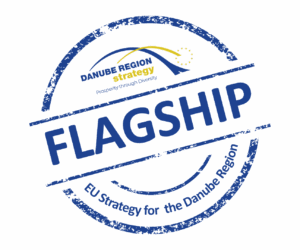Danube Strategy Flagships are projects or processes that contribute to the implementation of the EU Strategy for the Danube Region (EUSDR), have a clear macro-regional dimension and a multi-level governance approach. They are of high importance for the Danube Region’s economic, social and territorial cohesion and for improving the quality of life in the Danube Region.
Danube Strategy Flagships strengthen internal and external communication of the Strategy and the visibility of the topics, initiatives and prospects in the Danube Region. They illustrate the progress achieved in implementing the EUSDR and demonstrate exemplarily significant improvement in the Region that is induced by cooperation.
The Guidance Paper for identifying and listing Danube Strategy Flagships can be found here.

PA 3 – List of Danube Strategy Flagships
2025 – 2026
Project, Process, ongoing
CultHeRit is an initiative of 13 cultural heritage institutions and their associations from eight countries of the Danube region who gathered to identify and test solutions for the brain drain of young talents and professionals from the cultural heritage (CH) sector. This phenomenon manifests on both sectorial (from the cultural heritage to more lucrative sectors), and territorial (from East to West) level. To reverse this, the multidisciplinary partnership from the region aims to induce positive changes of the current employment practices in the cultural heritage institutes and museums (CHIM) in the region.
Further information: https://interreg-danube.eu/projects/cultherit/
Project, Process, ongoing
The IBC (Inclusive Border Cycling) project aims to promote social inclusion and sustainable tourism by enhancing and integrating cultural and natural heritage along cycling routes in disadvantaged, remote border areas of the Danube region. Specifically, it addresses challenges such as demographic issues, social vulnerability, and infrastructure gaps that affect these areas.
Further informations: https://interreg-danube.eu/projects/ibc/about-us
Project, process, network, platform; in preparation
EUSDR Priority Area(s): PA 3 Culture & Tourism
NEBoD is a think-and-do tank acting as an enabler for the green transition in the Danube Region through establishing a functional cooperation of public authorities, civil society, and the private, investment, and financial sectors to improve capacities of cities and regions for triggering and implementing investments into more responsible land use practices as a basis for new green and just economy. The initiative is also an innovative force, inventing and testing new methods and formats to involve different stakeholders in this transition and foster life-long education on all levels.
Further information:
2024 – 2025
Process, ongoing
EUSDR Priority Area(s): PA 3 Culture & Tourism
Creativity, innovation and collaboration are the three key focuses of this grant. Proposals that are rather “business as usual” or already running projects/programmes are not a priority. We are especially looking for project proposals that initiate suppletory or experimental cultural actions. Innovation can be related to the theme of the project, the genre or the type of collaboration/co-creation represented by the action. The quality of collaboration will be an important part of the evaluation.
We do not have any preference for a specific artistic field or discipline within cultural work or the creative industries. We understand ‘culture’ as a very wide field covering work far beyond the classical arts and culture domain.
This first DSPF call has no further thematic requirements, restrictions or specifications.
Further information: https://www.danubeculturalcluster.eu/project/danube-small-project-fund
Project, process, network, platform; in preparation
EUSDR Priority Area(s): PA 3 Culture & Tourism
The main output of the project will be the establishment of the Danube Tourism Laboratories (DaTuLabs). Activities of the Labs will include but not be limited to:
- the development of an online stakeholder’s cooperation platform (Sustainable Tourism Resource Centre),
- drafting of the Transnational Danube Tourism Roadmap as support to the long-term destination development,
- use of the participatory tools for planning,
- co-designing tourism initiatives and
- fostering eco-friendly smart tourism initiatives.
The project will identify and engage a wide range of stakeholders, including tourism policymakers, tourism boards, academia, businesses, local communities, and visitors. By providing stakeholders with the necessary tools, knowledge, and resources, the project aims to empower them to make informed decisions and take collaborative action towards sustainable tourism development. By combining cutting-edge technologies, participatory approaches, and cross-border cooperation, the project aims to unlock the socioeconomic potential of the Danube Region while preserving its natural and cultural heritage for future generations.
Project, process, network, platform; in preparation
EUSDR Priority Area(s): PA 3 Culture & Tourism
NEBoD is a think-and-do tank acting as an enabler for the green transition in the Danube Region through establishing a functional cooperation of public authorities, civil society, and the private, investment, and financial sectors to improve capacities of cities and regions for triggering and implementing investments into more responsible land use practices as a basis for new green and just economy. The initiative is also an innovative force, inventing and testing new methods and formats to involve different stakeholders in this transition and foster life-long education on all levels.
Further information: https://nebod.eu/
2023
Process; ongoing, up to 5-10 years
Submitted by / EUSDR Priority Area(s): PA 3 Culture & Tourism
The basic idea of the Danube Small Project Fund for Culture (DSPF) is to provide an uncomplicated funding platform for Danube-wide collaboration that can disburse even small amounts (<5,000 €) for the most important costs (travel expenses, organisation etc.) without major administrative hurdles. Such an uncomplicated small project funding scheme has been a long-term desire of the cultural sector in the Danube Region since the very beginning of the EUSDR activities.
Further information: https://www.danubeculturalcluster.eu/project/danube-small-project-fund
Project; ongoing, up to 5 years
Friends of the DANUBE (FOD) Camps provide an opportunity for young people to meet their peers along the Danube Region and to get in touch with local environmental organisations. The programme is organised through theory and practice, with:
- Guided workshops for youngsters, where they have the opportunity to talk with experts from various fields, such as rangers from national parks, researchers from biological institutions, local tourist organisations, water conservation experts, NGOs, etc.
- Practical education with various activities, such as bird watching, kayaking, trekking, tree planting, cycling, camping, or cooking.
Further information: https://www.friendsofthedanube.com/camps/
Process; preparatory phase; to be revised after 2 years
Submitted by / EUSDR Priority Area(s): PA 3 Culture & Tourism
Sustain and better connect all EUSDR Cultural routes (local/regional connectivity with existing or future routes):
Routes4U published a Roadmap for the Danube Region, which summarises the research results and the conclusions drawn during the meeting in Bucharest. The Roadmap highlights recommendations and steps to take in order to successfully develop the Cultural routes in the Danube Region.
You can find the complete list of Danube Strategy Flagships here.

